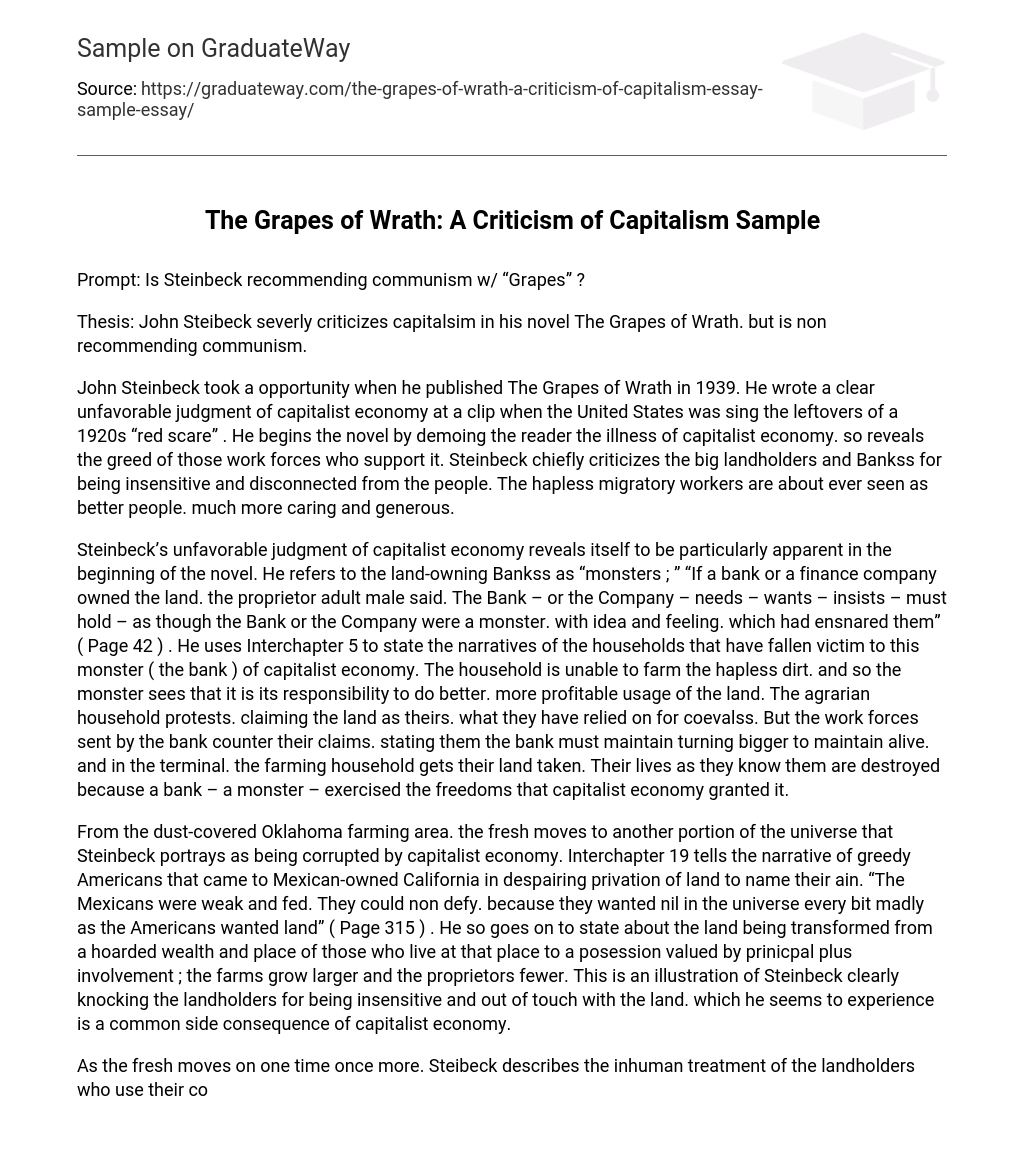Prompt: Is Steinbeck recommending communism w/ “Grapes” ?
Thesis: John Steibeck severly criticizes capitalsim in his novel The Grapes of Wrath. but is non recommending communism.
John Steinbeck took a opportunity when he published The Grapes of Wrath in 1939. He wrote a clear unfavorable judgment of capitalist economy at a clip when the United States was sing the leftovers of a 1920s “red scare” . He begins the novel by demoing the reader the illness of capitalist economy. so reveals the greed of those work forces who support it. Steinbeck chiefly criticizes the big landholders and Bankss for being insensitive and disconnected from the people. The hapless migratory workers are about ever seen as better people. much more caring and generous.
Steinbeck’s unfavorable judgment of capitalist economy reveals itself to be particularly apparent in the beginning of the novel. He refers to the land-owning Bankss as “monsters ; ” “If a bank or a finance company owned the land. the proprietor adult male said. The Bank – or the Company – needs – wants – insists – must hold – as though the Bank or the Company were a monster. with idea and feeling. which had ensnared them” ( Page 42 ) . He uses Interchapter 5 to state the narratives of the households that have fallen victim to this monster ( the bank ) of capitalist economy. The household is unable to farm the hapless dirt. and so the monster sees that it is its responsibility to do better. more profitable usage of the land. The agrarian household protests. claiming the land as theirs. what they have relied on for coevalss. But the work forces sent by the bank counter their claims. stating them the bank must maintain turning bigger to maintain alive. and in the terminal. the farming household gets their land taken. Their lives as they know them are destroyed because a bank – a monster – exercised the freedoms that capitalist economy granted it.
From the dust-covered Oklahoma farming area. the fresh moves to another portion of the universe that Steinbeck portrays as being corrupted by capitalist economy. Interchapter 19 tells the narrative of greedy Americans that came to Mexican-owned California in despairing privation of land to name their ain. “The Mexicans were weak and fed. They could non defy. because they wanted nil in the universe every bit madly as the Americans wanted land” ( Page 315 ) . He so goes on to state about the land being transformed from a hoarded wealth and place of those who live at that place to a posession valued by prinicpal plus involvement ; the farms grow larger and the proprietors fewer. This is an illustration of Steinbeck clearly knocking the landholders for being insensitive and out of touch with the land. which he seems to experience is a common side consequence of capitalist economy.
As the fresh moves on one time once more. Steibeck describes the inhuman treatment of the landholders who use their corrupt power to work work forces to decease and pull strings them to work for slave rewards during the Joad’s hunt for work. A premier illustration of how the landholders take advantage of work forces is their method of acquiring laughably inexpensive labour by directing out many more circulars than necessary so that more people come. That manner. the migratory workers fight over work. offering lower and lower rewards. Here Steinbeck is portraying capitalist economy as a disgusting system. go forthing full households with nil more than a twosome of dollars a twenty-four hours to populate on.
Even though Steinbeck evidently has a antipathy for capitalist economy. he is non needfully recommending communism. He is alternatively directing out the message that in order for our society to be successful. everyone in it needs to work together as a community. That doesn’t average people shouldn’t be able to do as much money as they want. but to be cognizant of how their actions are impacting their fellow citizens. Steinbeck proves this at Weedpatch cantonment: the community there is really successful. because everyone gives aid when it is needed. kin or non. Peoples are still allowed to do as much money and do whatever they want. every bit long as it is non harmful to another individual. Steinbeck is genuinely merely recommending the demand of a balance between the capitalist the Communist. the strong and the weak. the hapless and the wealthy.
Comments/Suggestions: My instructor idea I could hold explained the quotation mark I used in the beginning of the 2nd paragraph. and used a quotation mark to back up “The farming household protests…” toward the terminal of the paragraph. He besides thought I could hold used a back uping quotation mark someplace in the 4th paragraph.





